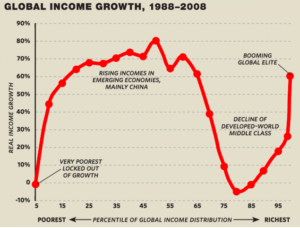In The American Prospect, Miles Corak reviews Branko Milanovic’s book, Global Inequality: A New Approach for the Age of Globalization.
Excerpt:
This book begins by posing a question: “Who has gained from globalization?” Many thoughtful Americans have the confidence to answer in a sentence. The gains have been captured by the top 1 percent. And the book ends with another question: “Will inequality disappear as globalization continues?” Many might be just as quick to answer: Of course not, the rich will get richer! But life is not so simple. Between these two questions Branko Milanovic offers us not just a plethora of facts about income inequality that will surely make his readers think twice. More importantly, he shows us the power of bringing the facts into focus by putting a new lens over these pressing issues—a global perspective. He takes more than 200 pages to answer the first question, and only a sentence to answer the second.
The most striking fact that motivates his book is a graph that the Twittersphere has already termed “the elephant curve.” This is the one-sentence, or rather one-picture, answer to the first question: “The gains from globalization are not evenly distributed.”
The elephant curve ranks the world’s citizens from those with the very lowest incomes to those with the very highest. It shows how much each group standing on the same rung of the 1988 global income ladder saw their income increase by 2008. The percentage increase in income over this period was significant for some, strikingly so for many others, but disappointing for others.
Read the entire book review of Global Inequality: A New Approach for the Age of Globalization by Branko Milanovic written by Miles Corak in The American Prospect.


